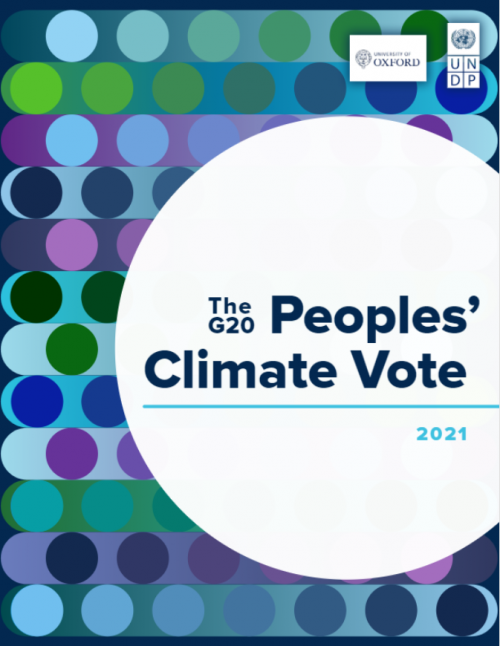
https://www.undp.org/publications/g20-peoples-climate-vote-2021
Find the full report here: https://www.undp.org/publications/g20-peoples-climate-vote-2021#modal-pu...
The G20 Peoples’ Climate Vote polled over 689,000 people across 18 of the G20 countries from October 2020 until June 2021. This includes over 302,000 young people under the age of 18. It leverages, an innovative survey methodology using mobile gaming networks.
In some countries, it is the first time that the voices of young people – who in many countries will be voting age in just a few years –are heard on climate change. This means the survey has significant value as a predictor of where public opinion is headed on climate policy. It also indicates where stronger efforts to educate the public may be required.
A huge poll of nearly 700,000 people, the G20 Peoples’ Climate Vote, shows public demand for climate action, according to a report published today by the UN Development Programme (UNDP) and the University of Oxford.
Without bold action from the G20, it will be impossible to keep global heating to 1.5C, to avert the worse impact of climate change. The world’s largest economies account 75% of global greenhouse gas[1] emissions.
The results showed for the first time the difference between children and adults’ levels of belief in climate change as a global emergency. Some 70% of under-18s surveyed subscribe to this view, compared with 65% of adults. The countries where under-18s were most supportive of this view, relative to adults, were Australia the US and India. The survey covered 18 of the G20 members, and included more than 302,000 under-18s
Professor Stephen Fisher, from Oxford’s Department of Sociology, who was the lead academic researcher for the project, says, ‘Our findings show that younger people within the G20 demand more immediate and interventionist types of environmental policies from governments. As this generation comes of voting age, political leaders should not ignore the bolder expectations of this emerging electorate when it comes to their policymaking.’
Younger people within the G20 demand more immediate and interventionist types of environmental policies from governments....political leaders should not ignore the bolder expectations of this emerging electorate
Professor Stephen Fisher
UNDP Administrator Achim Steiner, the former head of the Oxford Martin School, maintains, ‘A clear majority of citizens across the G20 believe we’re in a global emergency. Support for bold climate action is already widespread, and this data shows it will only strengthen in the years ahead, as young people exercise their voices and their votes to reward bold climate action.
‘G20 leaders are responsible for some of the biggest, most historic decisions imaginable. They must listen to the demands of their people, and of future generations who will inherit the consequences of actions – or inactions – of G20 leaders in Rome and in Glasgow in the days ahead.’
A clear majority of citizens across the G20 believe we’re in a global emergency. Support for bold climate action is already widespread
Achim Steiner
The report presents the levels of public support for 14 climate policies, among adults and under-18s, across three main areas: finance, reducing greenhouse gas emissions, and adapting to extreme weather events.
Both adults and under-18s support a transition to a green economy, with greater support among young people. But there were some interventions where adults were more in favour, such as making companies pay for their pollution.
Under-18s had greater support than adults on some bold climate policies, for reducing emissions, such as promoting renewable energy, electric cars. In the US, young support for electric vehicles and bicycles, was 13 percentage points higher than it was among adults, highlighting a potential future shift in demand for such policies.
But there were sometimes big gaps in the other direction. For instance, in Germany, adults were more likely to support reducing energy waste and using more clean energy in the transport of goods, with adult support respectively 15 and 14 percentage points higher than among under 18s.
Policies to help communities adapt to the impacts of climate change, such as extreme weather events, also saw differing levels of support among under-18s compared with adults. Young people generally were more supportive of early warning systems for disasters. They more also supportive of climate-friendly farming. Perhaps most striking was the extent to which young people were more supportive of providing good and affordable insurance, which is important for helping families, businesses and communities rebuild after extreme weather events. Overall support for insurance provision was five-points higher for young people than adults across the 18 countries surveyed.
[1] https://files.wri.org/d8/s3fs-public/2021-09/closing-the-gap-impact-g20-climate-commitments-limiting-global-temperature-rise-1-5c.pdf?VersionId=RlUJyvgmgnudRbZDDTG_x_nzcG57JMWd
The full text of the report can be seen here The G20 Peoples' Climate Vote 2021 | United Nations Development Programme (undp.org)










Add new comment